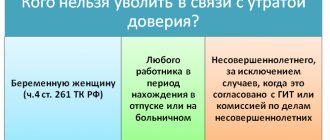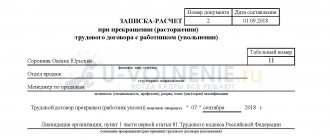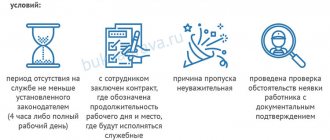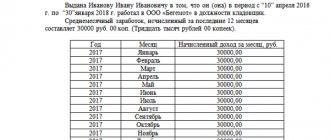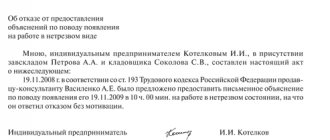Loss of trust
Labor legislation does not contain a definition of the concept of “loss of trust”; the employer decides this issue independently based on the nature of the actions performed by the employee, his business and personal qualities (appeal ruling of the Ulyanovsk Regional Court dated October 09, 2012 No. 33-3163/2012).
The basis for loss of trust must be the specific fact of the employee committing guilty actions, confirmed in writing (appeal rulings of the St. Petersburg City Court dated 09/07/2016 No. 33-15880/2016, Rostov Regional Court dated 02/11/2016 No. 33-2225/2016).
Based on loss of trust, employees who have committed intentionally or negligently actions that had or could have harmful consequences in the future can be dismissed (appeal ruling of the Krasnoyarsk Regional Court dated October 10, 2016 No. 33-13713/2016).
Examples of situations that led to loss of trust:
- theft, bribery (determination of the Primorsky Regional Court dated November 24, 2014 No. 33-10354);
- violation of the procedure for recording, storing and issuing inventory items (appeal ruling of the Krasnoyarsk Regional Court dated March 24, 2014 No. 33-2677);
- fictitious write-off of goods and valuables (appeal ruling of the Perm Regional Court dated May 30, 2012 No. 33-4374);
- accepting funds from buyers without punching a check (appeal ruling of the St. Petersburg City Court dated July 25, 2016 No. 33-13386/2016).
As practice shows, it is not easy to prove a loss of trust.
For example, if the inventory of property was carried out with violations, then the fact of shortage itself is not a basis for dismissal (appeal ruling of the Omsk Regional Court dated January 14, 2015 No. 33-50; ruling of the Primorsky Regional Court dated January 14, 2015 No. 33-222 (33-11109 /2014)). Please note that termination of an employment contract due to loss of trust is only possible for employees who directly service monetary or commodity assets. Moreover, you can also be fired if such actions (theft, bribery, etc.) did not occur at work (clause 45 of Resolution No. 2; ruling of the Moscow City Court dated November 14, 2016 No. 4g-12829/2016, Primorsky Regional Court dated November 24, 2014 No. 33-10354).
Employers often violate the disciplinary procedure. For example, the issue of applying a penalty to an employee was resolved before the expiration of two working days after a written explanation was requested from him. As a result, the court overturned the employers’ decision (appeal ruling of the Rostov Regional Court dated February 11, 2016 No. 33-2225/2016).
Disclosure of trade secrets
Disclosure of a trade secret that has become known to an employee in connection with the performance of his job duties is another reason to fire him (sub-clause “c”, clause 6, part 1, article 81 of the Labor Code of the Russian Federation).
If the employer does not take measures to protect trade secrets, does not prescribe in the regulations a detailed procedure for the admission of employees, the use of information, control (Part 1 of Article 10 of Federal Law No. 98-FZ of July 29, 2004 (hereinafter referred to as Law No. 98-FZ)), then it is unlawful to present claims to employees. However, not all information may be secret (for example, about wage arrears, violations of the law, etc.) (Article 5 of Law No. 98-FZ).
Methodology for assessing the performance of employees of Svyaz LLC (fragment) <...> 5.1 Criteria for violation of labor discipline by a specialist: rude communication with the client, consisting of disrespect for the client, use of the imperative mood without polite words, raising the voice, rudely interrupting the client, using profanity , insulting the client, dumping the client. <…>
Thus, the courts indicated that the employee is not guilty of disclosing secrets in the following cases:
- the documents do not have the stamp “trade secret” and no indication of the owner of this information, no registration of persons who received access to the information (appeal ruling of the St. Petersburg City Court dated June 23, 2015 No. 33-10630/2015);
- the employee was not familiarized with the list of confidential information under signature (decision of the Moscow City Court dated June 22, 2011 No. 33-19046);
- there is no information on whether the disclosed information constitutes a trade secret (appeal ruling of the Novosibirsk Regional Court dated July 14, 2016 No. 33-6921/2016).
If the employer complies with the procedure for establishing a trade secret, it will not be a problem to prove in court the illegality of the actions of the employee who disclosed company secrets (appeal rulings of the Moscow City Court dated September 26, 2016 No. 33-16923/2016, dated May 26, 2016 No. 33-20465/2016).
Appearing drunk
It is unacceptable for an employee to appear at work in a state of alcohol, drug or other toxic intoxication (paragraph 2, part 1, article 76 of the Labor Code of the Russian Federation).
According to the arbitrators, the state of intoxication can be confirmed both by a medical report and other types of evidence (clause 42 of Resolution No. 2). For example, testimonies of witnesses, written (act of the employee appearing at work in a state of intoxication, act of suspension from work) and material evidence (appeal rulings of the Sverdlovsk Regional Court dated May 17, 2016 No. 33-8688/2016, St. Petersburg City Court dated 04/09/2015 No. 33-4500/2015, Novosibirsk Regional Court dated 07/09/2013 No. 33-5287/2013), audio and video recordings, expert opinions.
Often, intoxication is detected based on external signs (incoherent speech, lack of coordination of movements, persistent smell of alcohol) (appeal rulings of the Chelyabinsk Regional Court dated April 25, 2016 No. 11-5736/2016, St. Petersburg City Court dated February 24, 2016 No. 33-3251/ 2016, Court of the Chukotka Autonomous Okrug dated January 21, 2016 No. 33-6/2016). However, the presence of such signs does not always indicate alcohol or drug intoxication. An employee may be sick or experience side effects of medications (determined by the Primorsky Regional Court dated 07/09/2015 No. 33-5668). If an employee does not agree with the conclusions of the commission, then a medical examination cannot be avoided.
Thus, the employer must have indisputable evidence confirming the fact that the employee is intoxicated, otherwise his dismissal will be declared illegal by the court (appeal ruling of the Perm Regional Court dated September 17, 2014 No. 33-8353).
Failure to comply with the dress code
The employer has the right to legitimize a corporate dress code at work.
However, the issue of applying disciplinary sanctions for lack of uniform is controversial. Internal labor regulations (fragment) <…> 8. Requirements for the appearance of employees. 8.1 Employees whose responsibilities include working with clients must adhere to formal business attire in the workplace. 8.1.1 Official business style of clothing for men: a business suit of a classic cut and color in combination with a shirt (plain turtleneck) and tie. 8.1.2 Official business style of clothing for women: suits (dresses) in calm tones and shoes of a strict business style. 8.1.3 For official business style, the following are excluded: denim clothing, sports shoes. <…>
For some workers, wearing a uniform is expressly required by law. For example, for workers of railway (Clause 1 of Article 29 of the Federal Law of January 10, 2003 No. 17-FZ) and air transport (Order of the Ministry of Transport of Russia of June 24, 1992 No. DV-69), hotels (Order of the Ministry of Culture of Russia of July 11, 2014 No. 1215), departmental security (Part 5 of Article 6 of the Federal Law of April 14, 1999 No. 77-FZ), etc. In these cases, refusal to wear a uniform is a disciplinary offense (appeal rulings of the Samara Regional Court dated October 22, 2014 No. 33-10541/2014, Khabarovsk Regional Court dated August 27, 2014 No. 33-5444/2014).
According to the author, commercial organizations also have the right to introduce a dress code for their employees, and failure to comply with the requirements for the appearance of employees is a violation of labor discipline (appeal ruling of the Omsk Regional Court dated September 17, 2014 No. 33-5647/2014).
Uniforms allow the client to identify an employee of this organization and contact him. Therefore, many employers prohibit the wearing of uniforms during non-working hours. In case of violation, disciplinary action may also be imposed on such employees (appeal ruling of the St. Petersburg City Court dated October 16, 2013 No. 33-15736/2013).
